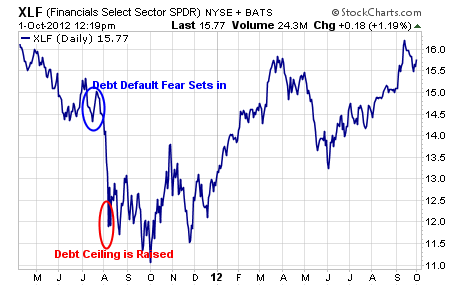By now, most of you have heard about the fiscal cliff.
To sum: it’s the impending double whammy of planned government spending cuts and rising taxes that is slated to take effect at the end of this year as part of President Obama’s Budget Control Act.
Some analysts are predicting that such a scenario would put us over a so-called “fiscal cliff” – and into another recession. One analyst is forecasting that unemployment will eclipse 9% again should the law take effect at midnight on December 31.
Whether you believe in such a doomsday scenario probably depends on your political preference. Some may dismiss the fiscal cliff as being 2013’s version of Y2K. Others see it as the 2008 financial collapse all over again.
Either way, it should impact the stock market.
If Obama gains re-election in early November and the Democrats retain control of Congress, that will certainly send a wave of panic through the doomsayers, and perhaps spark a massive sell-off the last two months of 2012.
Should Mitt Romney pull off the upset (according to current polls) and many of his fellow Republicans win their Congressional races, that would at least put the fiscal cliff scenario on the back burner – if not the scrap heap – and likely prompt a late-year rally.
Real or imagined, the fiscal cliff WILL have an impact on the market one way or another. Should Obama win the election and the worst-case scenario – declining GDP growth, rising unemployment, widespread belt tightening – play out, then certain sectors of the U.S. economy will really take it on the chin.
Three sectors in particular are sure to be negatively impacted by the mere possibility of the fiscal cliff. Those are:
-The Big Banks. Remember how bank stocks went in the tank in the summer of 2011 as Congress waited until the last minute to raise the debt ceiling? Here’s a chart of the Financial Select Sector SPDR (NYSEArca: XLF) ETF to refresh your memory:

Expect that scenario to repeat itself the longer this fiscal cliff looms. The specter of less spending and a backtracking economy always puts pressure on banks. To make matters worse, the Federal Reserve will be performing its latest round of stress tests on U.S. banks in late November and early December. If a fiscal cliff is still looming by then, some major financial institutions might not pass the test. That wouldn’t bode well for the likes of Bank of America (NYSE: BAC), Citigroup (NYSE: C), Morgan Stanley (NYSE: MS) and Goldman Sachs (NYSE: GS) – stocks that fell roughly 35% on average during the debt-ceiling debate.
-Retail Stocks. Holiday shopping season always make November and December the most profitable months on the calendar for U.S. retailers. But if the fiscal cliff erodes consumer confidence the way some think it will, this could be a light shopping season compared to the typical holiday windfall. The belt tightening could actually be good news for shares of cheaper retailers such as Wal-Mart (NYSE: WMT) and Family Dollar (NYSE: FDO). However, it would likely hurt sales at mid- to higher-end retailers such as Amazon (NASDAQ: AMZN), Macy’s (NYSE: M) and Michael Kors (NYSE: KORS).
-The Auto Industry. Auto sales are generally lumped in with all other retailers. But the fiscal cliff’s impact on the auto industry could be two-fold. For one, U.S. consumers may feel less emboldened to buy a new car, damaging sales at industry leaders such as Ford (NYSE: F), General Motors (NYSE: GM) and Honda (NYSE: HMC). Second, manufacturers that supply auto parts such as U.S. Steel (NYSE: X) and Goodyear Tire & Rubber (NYSE: GT) may also see a steep decline in demand – and, by extension, their share prices.
Will the fiscal cliff send us plummeting into a second recession? Will it push unemployment back to 2010 levels? Will it force us all to load up on water, Twinkies and gold bars and find a bunker to hide in for the next year?
No one knows for sure – and anyone who tells you he or she does is lying.
What we do know is that the mere possibility of a fiscal cliff will cause fear among investors and consumers alike as December 31 draws near. And that fear will impact some sectors more than others.
That’s why I’ve put together a simple petition – to tell our elected leaders to avoid this fiscal cliff and keep dividend taxes low. If you feel the same, I hope you’ll join me in signing this petition by clicking here now.
 Facebook
Facebook
 Twitter
Twitter